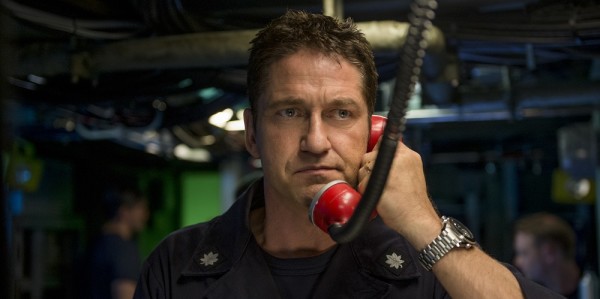

The Pentagon’s press briefing room was filled with reporters and photographers on Monday, but they weren’t waiting for Defense Secretary James Mattis or his spokeswoman Dana White.
Instead, the actor Gerard Butler – King Leonidas himself – took the podium to answer questions.
Neither Mattis nor White use the briefing room much anymore. White’s last news conference was in May and Mattis has conducted two on-camera briefings this year: After the April 13 strikes on Syria and then in August to tell reporters that planning was continuing for war games in South Korea – President Trump appeared to contradict him shortly thereafter.
With Mattis and White enroute to Vietnam on Monday, Butler became the de facto face of the U.S. military when he talked to the Pentagon press corps about the Navy’s help for his upcoming film “Hunter Killer,” in which he plays the captain of a fast attack boat that is part of a mission to rescue Russia’s kidnapped president.
Unsurprisingly, the movie is the most adoring love letter to the Navy since “The Hunt For Red October” more than a generation ago – though it lacks the brooding pace of Tom Clancy-inspired military thrillers.
Butler praised the Navy relentlessly for allowing him and the movie’s director to spend time on submarines so that they could make “Hunter Killer” feel more authentic for moviegoers.
“I’d like to thank the Navy for all their help because we couldn’t have done it without them – or we could, but it would not have been a good movie,” Butler said.
Despite Butler’s obvious commitment to making “Hunter Killer” as accurate as possible, in one scene his character clearly says “Oorah” — the Marine Corps’ battle cry.
So Task & Purpose asked him on Monday whether the line was a shout out to his many fans in the Marine Corps – the other maritime service.
“Absolutely, yes!” he replied. “It was a shout-out to anyone who would listen.”
Butler explained that he heard one of the sailors say “Oorah” about a submarine, so he decided it would work perfectly for the film.
“I was very gratified and excited to hear when they first did it,” Butler said. “And that was something that wasn’t originally in our movie but that really worked beautifully at a very appropriate point in the drama.”
Cmdr. Sarah Self-Kyler, of U.S. Submarine Force, told Task & Purpose that submariners do not say “Oorah” a lot, but it is possible that sailors aboard the submarines that Butler visited had used the term.
“Each submarine has a unique battle cry,” Self-Kyler said on Monday. “The use of ‘Oorah’ is not widespread across the submarine force.”
Butler is an aficionado of submarine movies including his favorite, “Das Boot:” A German movie about a U-Boat during World War II. His first film role was a British sailor in a James Bond movie. His line was four words – “Torpedoes bearing, range 6,000” – but it was cut to just two words at the advice of a Royal Navy adviser, he said.
“Ever since then, it was my dream to play a naval commander, to act in the movie, and to produce the movie so that nobody could cut my lines,” Butler said.
